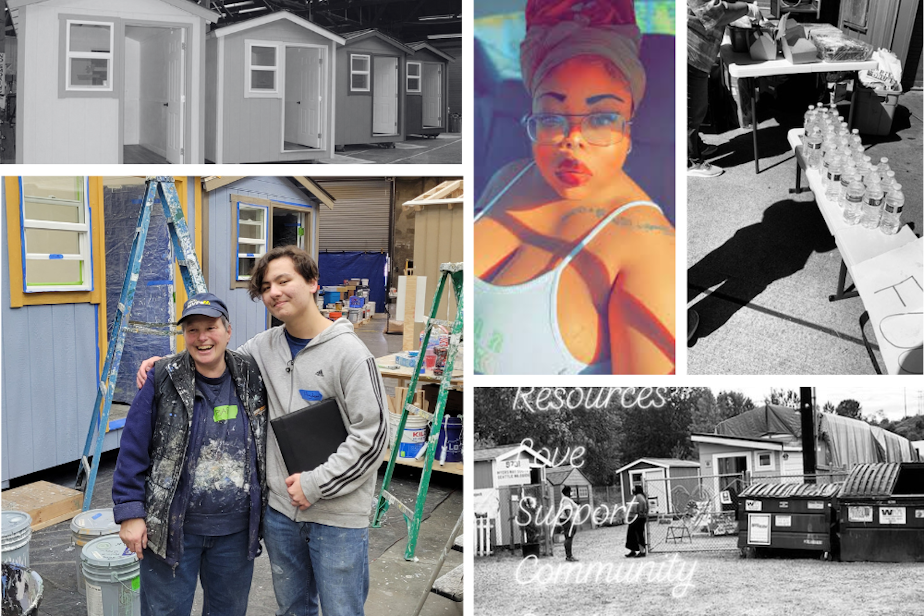They once faced housing insecurity themselves. Now they help other Seattleites find stability

At least 53,000 people experienced homelessness in King County last year. And that number is up almost 30% since 2020.
Behind each of these numbers is a person, and a story. RadioActive’s Hayden Yu Andersen talked with two people who are dedicated to addressing the region's homelessness crisis.
[RadioActive Youth Media is KUOW's radio journalism and audio storytelling program for young people. This story was entirely youth-produced, from the writing to the audio editing.]
O
kesha Brandon left an abusive household at 18 and spent years without a home to call her own. Moving from place to place, she told me, leaves a mark.
When she was homeless, Brandon says most people she passed on the street didn’t even make eye contact with her. It felt dehumanizing.
Sponsored
"I deserve the world," Brandon said. "I deserve to be housed. I deserve love. I deserve companionship. I deserve to be treated justly."
When she did receive support, Brandon says she was expected to show a ton of gratitude, regardless of how minimal the support was.
"Just because I am homeless does not mean that I should be thankful for that dollar, I should be thankful that you're opening up your space to me, I should be thankful that you're looking my way," she said.
Brandon has had housing for almost five years now. Today, she spends her time writing poetry, running her own small business, and serving on the King County Regional Homelessness Authority Implementation Board.
She’s also one of the founders of the Washington State Lived Experience Coalition. It’s an advocacy group of people who have been affected by homelessness, who offer their support to people who are unhoused, and who partner with the city and other local organizations to develop solutions to the crisis.
Sponsored
"Our outreach program where we go out on the streets, and we meet people, and we have relations, and we build that trust, and then we offer them opportunities and ways to get on their feet and become their best selves, without us necessarily pushing them into doing it, but giving them the pieces and the tools to do so."
Brandon says the Coalition also offers skill-sharing, and spaces for art, culture, and healing.
But the root of the homelessness crisis is housing. Most people want a permanent home near their job and the people they know, with a bathroom and kitchen, a locking door, and where they can easily access supportive services.
But in King County, permanent, supportive housing like that is hard to access. So in the meantime, outreach workers often direct people living in tents and RVs to temporary emergency shelters, like Tiny House Villages.
And that’s where people like Barb Oliver come in. Oliver manages a group called Sound Foundations NW. They build the tiny houses for Tiny House Villages. Oliver came to this work after experiencing eviction. A friend gave her a place to stay.
Sponsored
"I vowed at that point, if I ever had a chance to pay it forward, I would," Oliver said.
Sound Foundations NW has built 350 tiny homes in the past 15 months. All the work is done by volunteers. I’m one of those volunteers, and during my time there, Oliver and I worked with people from all walks of life.
"We have one guy that builds with us who is one of the original Microsoft millionaires," Oliver said. "And so he was working next to this guy named Chris that didn't even have a home yet. He was still living on the streets, and just coming in because he didn't want to spend his day in the library. He'd rather be building with us."
The housing crisis in the Seattle area is complex, and there’s no one solution. In fact, according to the Lived Experience Coalition, tiny homes aren’t a permanent solution to homelessness, coming with their own issues such as a lack of proper living conditions, or even by distracting policymakers from investing in other solutions.
But if there was one thing I heard from both Brandon and Oliver, it’s to center the people at the heart of this crisis. For Brandon, that means amplifying the voices of unhoused people through her work with the Lived Experience Coalition.
Sponsored
"We have our own platforms, our own things we're creating; we're putting our own stories out there, Brandon said.
And for Oliver, that means taking the time to learn the stories of the people she helps.
"I mean the good, the bad, the ugly is out there," Oliver said. "But more often than not, it's good. And more often than not, when somebody hugs you so tight you can't breathe, and looks you in the eye with tears in their eyes and says, 'You saved my life,' that's a good day."
In a situation where people are often dehumanized, that element of humanity is, as these two have proven, absolutely vital.
Sponsored
This story was produced in a RadioActive Youth Media Advanced Producers workshop for high school and college-age youth. Production assistance by Nina-Tuyen Tran and Kelsey Kupferer. Edited by Mike Davis. Consultation support by Bryant Carlin and Casey Martin. Prepared for the web by Kelsey Kupferer.
Find RadioActive on Instagram, TikTok, YouTube and Facebook, and on the RadioActive podcast.
Support for KUOW's RadioActive comes from the Bill & Melinda Gates Foundation Discovery Center and BECU.



